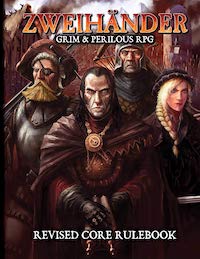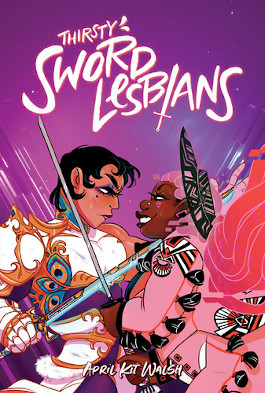
A role-playing game is a game in which players assume the roles of characters in a fictional setting. Players take responsibility for acting out these roles within a narrative, either through literal acting or through a process of structured decision-making regarding character development. Actions taken within many games succeed or fail according to a formal system of rules and guidelines.

Fate is a generic role-playing game system based on the Fudge gaming system. It has no fixed setting, traits, or genre and is customizable. It is designed to offer minimal obstruction to role-playing by assuming players want to make fewer dice rolls.

Shadowrun is a cyberpunk-fantasy action role-playing video game for the Super Nintendo Entertainment System, adapted from the tabletop role-playing game Shadowrun by FASA. The video game was developed by Australian company Beam Software and first released in 1993 by Data East.

The Gamers is a 2002 film written and directed by Matt Vancil and produced by independent movie company Dead Gentlemen Productions. It is an affectionate spoof of role-playing games, and often shown at gaming conventions.
The Gamers: Dorkness Rising is a feature-length film produced by Dead Gentlemen Productions, and focuses on a group of tabletop role-playing gamers as their gamemaster attempts to shepherd them through a campaign that they have played through three times and have yet to actually finish. While the film is set in the same universe as and has a similar theme to its predecessor, The Gamers, it is not a direct sequel to the first film, as it focuses on a different group of players. Also, unlike its predecessor, this film dedicates a substantial portion of the film to the players themselves, and not their characters. It began filming in 2005 and was set for release in 2006, and was finally released at Gen Con in Indianapolis by Anthem Pictures on August 14, 2008. Paizo had an exclusive sales window for the 2008 Gen Con convention where the cast and crew of The Gamers: Dorkness Rising were signing copies at the Paizo booth.
Evil Hat Productions is a company that produces role-playing games and other tabletop games. They are best known for the free indie RPG system Fate, Blades in the Dark, and Thirsty Sword Lesbians, all of which have won multiple awards.

A tabletop role-playing game, also known as a pen-and-paper role-playing game, is a kind of role-playing game (RPG) in which the participants describe their characters' actions through speech and sometimes movements. Participants determine the actions of their characters based on their characterization, and the actions succeed or fail according to a set formal system of rules and guidelines, usually involving randomization. Within the rules, players have the freedom to improvise, and their choices shape the direction and outcome of the game.

Fiasco is a role-playing game by Jason Morningstar, independently published by Bully Pulpit Games. It is marketed as a "GM-less game for 3–5 players, designed to be played in a few hours with six-sided dice and no preparation". It is billed as "A game of powerful ambition and poor impulse control" and "inspired by cinematic tales of small time capers gone disastrously wrong—films like Blood Simple, Fargo, The Way of the Gun, Burn After Reading, and A Simple Plan."

Onyx Path Publishing is a publisher of tabletop role-playing games that produces company-owned and creator-owned games as well as licensed products.

Powered by the Apocalypse (PbtA) is a tabletop role-playing game design framework developed by Meguey Baker and Vincent Baker for the 2010 game Apocalypse World and later adapted for hundreds of other indie role-playing games.

Hand of Fate is an action role-playing roguelike deck-building game developed and published by Australian studio Defiant Development for Linux, macOS, Microsoft Windows, PlayStation 4, and Xbox One, released via early access on 7 July 2014, and then in the full release on 17 February 2015. A PlayStation Vita version was announced but ultimately cancelled due to development issues.
Luke Crane is a game designer specializing in indie role-playing games.

Blades in the Dark is a fantasy tabletop role-playing game by John Harper, set in a fictional city of Doskvol, inspired by Victorian London and Gothic fiction. The game was crowdfunded on Kickstarter in 2015 and published at the start of 2017.

Pathfinder: Kingmaker is an isometric role-playing game developed by Russian studio Owlcat Games and published by Deep Silver, based on Paizo Publishing's Pathfinder franchise. Announced through a Kickstarter campaign in 2017, the game was released for Microsoft Windows, macOS, and Linux on 25 September 2018.

Zweihänder Grim & Perilous RPG or Zweihänder is a 2017 dark fantasy tabletop role-playing game designed by Daniel D. Fox. Zweihänder won two gold ENNIE Awards. Zweihänder was designed for unusually punishing combat.
Modiphius Entertainment is a tabletop role-playing game and board game publisher based in Fulham, London that is known for licensed adaptations of established media. Notable titles include Star Trek Adventures, Fallout the Roleplaying Game,Dune: Adventures in the Imperium, Terry Pratchett’s Discworld: Adventures in Ankh-Morpork, and the Mass Effect board game.
The Cortex System is a collection of related roleplaying games. Its most recent iteration, Cortex Prime, was designed by Cam Banks and initially published by Fandom Tabletop, then acquired by Dire Wolf Digital. Prior versions appeared in the licensed roleplaying games published by Margaret Weis Productions, where it was used as the house system. Cortex is an adaptable game system focusing on characterization and story development.

Avatar Legends: The Roleplaying Game is a fantasy tabletop role-playing game produced by Magpie Games. It is set in the world of the animated television series Avatar: The Last Airbender and The Legend of Korra, and takes place in five different time periods. Players take the roles of martial artists, technological experts, or benders – people who can manipulate one of the four classical elements – who fight for balance in the world while also working towards their own goals and struggling with inner balance, represented by opposing ideals held by a character.

Thirsty Sword Lesbians is a narrative-focused tabletop role-playing game that emphasizes telling "melodramatic and queer stories". The game was funded via a 2020 Kickstarter campaign and published by Evil Hat Productions in 2021. It uses a modification of the Powered by the Apocalypse game system.

Fall of Magic is a collaborative storytelling tabletop role-playing game by Ross Cowman that is played on a hand-printed canvas map. The story follows a dying magus and companions on their journey to the birthplace of magic. The players utilize the map to track game progression as they unroll it. Fall of Magic is an entirely creator-produced indie role-playing game.












